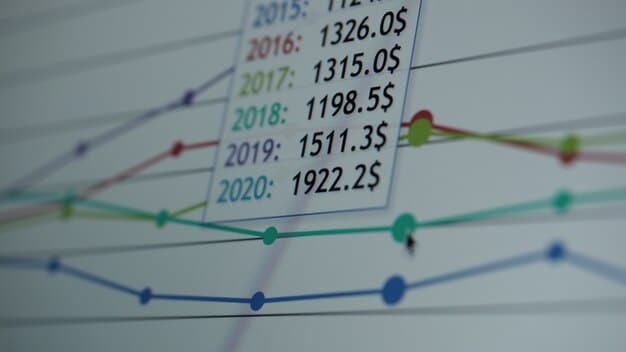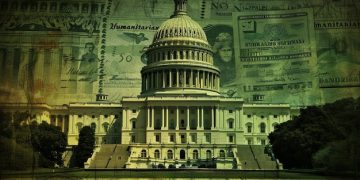Federal Reserve Rate Hike: How It Impacts Your 2025 Taxes

The latest Federal Reserve rate hike directly influences various aspects of your 2025 taxes, impacting savings account interest, mortgage rates, and potentially leading to adjustments in tax brackets and deductions, which can affect your overall tax liability.
Navigating the complexities of tax planning can be challenging, especially when the Federal Reserve makes adjustments to interest rates. What are the actual implications of the latest rate hike for your 2025 taxes?
Understanding the Federal Reserve’s Rate Hike
The Federal Reserve, often called the Fed, plays a crucial role in managing the U.S. economy. One of its primary tools is adjusting the federal funds rate. But how high can these rates go and what are some other considerations?
What is the Federal Funds Rate?
The federal funds rate is the target interest rate that commercial banks charge one another for the overnight lending of reserves. This rate influences other interest rates throughout the economy.
Why Does the Fed Hike Rates?
The Fed typically raises rates to combat inflation. Higher interest rates can cool down the economy by making borrowing more expensive, which reduces spending and investment.
- Controlling Inflation: Rate hikes aim to curb inflation by increasing borrowing costs and reducing aggregate demand.
- Economic Stability: The Fed seeks to maintain stable prices and full employment.
- Market Influence: Rate adjustments affect other interest rates, influencing savings, investments, and loans.
Understanding these fundamental aspects of the Fed’s rate hikes is essential to anticipate their effects on various facets of personal finance and, more specifically, your 2025 taxes.

The Direct Impact on Savings and Investments
One of the most immediate effects of a Federal Reserve rate hike is on savings accounts and investment yields. Be prepared for some interesting outcomes.
Savings Account Interest Rates
When the Fed raises rates, banks often increase the interest rates they offer on savings accounts, certificates of deposit (CDs), and other savings products. While it is not assured, you should notice the uptick.
Investment Yields
Higher interest rates can also affect investment yields. Bond yields tend to rise, making them more attractive to investors. However, the stock market can react negatively to rate hikes due to concerns about slower economic growth.
- Higher Savings Returns: Benefit from increased interest rates on savings accounts and CDs.
- Bond Market Shifts: Monitor bond yields for potentially more attractive investment opportunities.
- Equity Market Volatility: Be aware of potential fluctuations in stock market performance due to economic cooling.
For your 2025 taxes, higher interest income from savings and investments will be taxable. It’s important to keep accurate records of your earnings to ensure accurate tax reporting.
Mortgage Rates and Homeowners
For homeowners and potential homebuyers, Federal Reserve rate hikes can have significant implications for mortgage rates. What should homeowners expect?
Rising Mortgage Rates
Mortgage rates typically follow the direction of the federal funds rate. When the Fed raises rates, mortgage rates also tend to increase, making it more expensive to buy a home or refinance an existing mortgage.
Impact on Home Equity
Higher mortgage rates can cool down the housing market, potentially impacting home values and equity. This is a significant consideration if you plan to sell your home or tap into your home equity.
For your 2025 taxes, changes in mortgage interest rates can affect your mortgage interest deduction. Keep detailed records of your mortgage payments to accurately claim this deduction.

Tax Bracket Adjustments and Standard Deductions
Federal Reserve rate hikes can indirectly influence tax brackets and standard deductions. This is generally a trickledown effect.
Inflation Adjustments
The IRS adjusts tax brackets and standard deductions annually to account for inflation. Rate hikes aimed at controlling inflation can affect the extent of these adjustments.
Impact on Tax Liability
Smaller inflation adjustments could mean that more of your income is taxed at higher rates, increasing your overall tax liability. Conversely, larger adjustments could provide some tax relief.
- Monitor Inflation: Keep an eye on inflation rates to anticipate potential tax bracket adjustments.
- Tax Planning: Adjust your tax planning strategies based on expected changes to tax brackets and deductions.
- Consult a Professional: Seek advice from a tax professional to optimize your tax strategy.
Understanding how inflation adjustments impact your tax liability is crucial for effective tax planning in 2025.
Business and Investment Tax Implications
Federal Reserve rate hikes can also have specific tax implications for businesses and investors. It can be difficult to anticipate all the possible outcomes.
Capital Gains and Dividends
Higher interest rates can influence the performance of investments that generate capital gains and dividends. Slower economic growth can reduce corporate profits, affecting stock prices and dividend payouts.
Small Business Taxes
Small businesses may face higher borrowing costs, impacting their ability to invest in growth and expansion. This can affect their taxable income and deductible expenses.
Accurate financial records and proactive tax planning are essential for businesses and investors to navigate these changes effectively.
Strategies for Managing Your 2025 Taxes
Given the potential impacts of the Federal Reserve rate hike, it’s important to develop strategies to manage your 2025 taxes effectively. Good planning is the key!
Review Your Tax Withholding
Ensure that your tax withholding from your paycheck is sufficient to cover your tax liability. Adjust your W-4 form if necessary to avoid underpayment penalties.
Maximize Deductions and Credits
Take advantage of all available tax deductions and credits, such as the standard deduction, itemized deductions, and various tax credits for education, child care, and energy efficiency.
- Adjust Withholding: Update your W-4 form to align with potential tax changes.
- Itemize Strategically: Decide whether to take the standard deduction or itemize based on your circumstances.
- Seek Professional Advice: Consult with a tax advisor to develop a tailored tax strategy.
By taking proactive steps to manage your taxes, you can minimize the impact of the Federal Reserve rate hike on your financial situation.
Long-Term Financial Planning
Finally, consider the long-term implications of Federal Reserve policy on your financial planning. You need an overall plan to succeed.
Retirement Savings
Higher interest rates can affect retirement savings, both positively and negatively. Higher bond yields can boost returns on fixed-income investments, while slower economic growth can impact equity investments.
Debt Management
Develop a plan to manage debt effectively, particularly variable-rate debt such as credit cards and adjustable-rate mortgages. Consider strategies such as debt consolidation or balance transfers to lower your interest costs.
Long-term financial planning requires a holistic view of your financial situation, considering the potential impacts of Federal Reserve policies, inflation, and other economic factors.
| Key Point | Brief Description |
|---|---|
| 💰 Savings Impact | Higher savings rates may increase taxable interest income. |
| 🏠 Mortgage Rates | Increased rates can affect mortgage interest deductions. |
| 📈 Investment Yields | Watch for changes in bond yields and market volatility. |
| 💼 Business Taxes | Higher borrowing costs can impact taxable income and expenses. |
How does the Fed rate hike affect savings accounts?
Interest rates on savings accounts typically increase, offering higher returns.
What is the impact on mortgage rates?
Expect mortgage rates to rise, making home purchases more expensive.
How do tax brackets get adjusted?
The IRS adjusts tax brackets annually for inflation, influenced by rate hikes.
What happens to the stock market?
The stock market may experience volatility due to concerns about economic slowdown.
What tax strategies should I consider?
Review withholding, maximize deductions, and consult a tax professional.
FAQ
▼
The Federal Reserve rate hike generally leads to increased interest rates on savings accounts. This means you can earn more on your savings. However, the increase in interest earned is taxable income, which you’ll need to report on your 2025 tax return.
▼
When the Fed raises rates, mortgage rates typically increase, making it more expensive to buy a home or refinance an existing mortgage. This could affect the amount of interest you pay over the life of your loan and, consequently, your mortgage interest deduction for 2025.
▼
The IRS adjusts tax brackets and standard deductions annually to account for inflation. Federal Reserve rate hikes, aimed at controlling inflation, indirectly influence the extent of these adjustments. Smaller adjustments could mean more of your income is taxed at higher rates.
▼
The stock market can react negatively to rate hikes due to concerns about slower economic growth. It is important to monitor your investment portfolio and be prepared for potential fluctuations in stock market performance as an alternative to savings or bonds investments..
▼
Consider reviewing your tax withholding, maximizing deductions and credits, and consulting a tax professional. With your tax pro, discuss strategies and seek proactive advice to manage your taxes effectively. This will minimize the impact of the Federal Reserve rate hike on your financial situation..
Federal Reserve rate hikes can have far-reaching effects on your 2025 taxes, affecting savings, investments, mortgage rates, and tax bracket adjustments. By understanding these impacts and developing proactive strategies, you can navigate these changes effectively and minimize their impact on your financial well-being.





